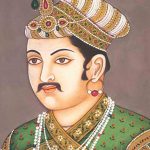Mughal Emperor Akbar
Biography of Emperor Akbar
- Akbar was born in Umerkot in present-day Sindh, Pakistan as the son of Humayun and Hamida Banu Begum on 15 October 1542. He was born in a Rajput fortress where his parents were living in refuge under the local ruler Rana Prasad. He was raised by his uncles and aunts in Kabul. His full name was Abu’l-Fath Jalal-ud-din Muhammad Akbar.

- Humayun had fled to Sindh after his defeat by Sher Shah Suri of the Sur Dynasty around 1540, and he succeeded in getting the Mughal Empire back only in 1555. But after a few months, he died and left the empire into the hands of his 13-year-old son Akbar, in 1556. Akbar was declared Shahanshah by his regent Bairam Khan in Kalanaur, Punjab. Bairam Khan acted as regent until 1560 when he was dismissed by Akbar.
- Akbar went on to extend his father’s empire substantially through successful military conquests and astute political marriages with Rajput families.
- He occupied Delhi, Agra, Lahore, Multan and Malwa. He then focused on Rajputana and engaged in warfare with the Rajputs from 1561. Through conquests, he was able to bring almost the whole of Rajputana under Mughal suzerainty. He built a new capital Fatehpur Sikri after his victory over the Rajputs. He also annexed Bengal and Gujarat and later added Kabul, Baluchistan and Kandahar.
Adminisration under Emperor Akbar
- Akbar was a shrewd administrator. The various departments were given precise responsibilities and organised properly. The kingdom was divided into Subahs each of which was administered by governors. The governors kept the troops for defence and military purposes. But the right to collect taxes on property were given to other officials. Akbar also had a policy of transferring officials periodically. He gave fixed salaries to the officials based on their ranks. Thus, he ensured the integrity of his empire by not allowing any official or governor to grow too powerful and break away from his empire.
- He prohibited Sati and legalised widow remarriage. He also increased the age of marriage.
- Akbar introduced the Mansabdari system of administration. Under this system, there were Mansabdars or officials/nobles who were given jagirs (land revenue assignments). A Mansabdar’s rank dictated the number of soldiers under his command. His salary was paid in cash and the title was not hereditary. A Mansabdar had to perform civil and military duty when asked by the king.
- The empire’s land revenue system was reformed by Akbar and the dahsala system came to be adopted. One of Akbar’s chief courtiers Raja Todar Mal is said to have come up with this system wherein the revenue was fixed as 1/3rd of the previous ten years’ average produce. Peasants were given remission when the harvest failed due to flood or drought.
- Akbar’s capital city was Agra for the most part of his reign. Fatehpur Sikri and Lahore had also served as capitals.
- Akbar had many wives and there were Hindu Rajput princesses among them. These Hindu queens were allowed to practice their own faith.
- Akbar was known for his religious tolerance and even took part in Hindu festivals. He liked to learn about other faiths and had discussions about various religions in his court. He even banned the slaughter and sale of meat on certain days of the year. He was also deeply influenced by Sufism. He banned Shia-Sunni conflicts from his empire. Akbar patronised talent and art irrespective of faith.
- He founded a new religious philosophy based on his learnings and called it Din-ilahi. But it died a natural death after Akbar’s time.
- Akbar’s biography is called Akbarnama and was written by Abul Fazl in Persian.
- Emperor Akbar had brilliant men in his court and the most prominent of them were called navaratnas (nine jewels). Some of them were Birbal, Raja Todal Mal, Abul Fazl, Tansen, etc.
- In the military, Akbar brought many innovations and sought the help of Ottomans and Europeans in this regard. He encouraged the use of firearms in his military. He also modernised cannons and fortifications and used elephants in warfare.
- His government encouraged traders and protected them. Akbar’s reign is marked by economic and religious harmony and he is hence called ‘Akbar the Great’.
- Akbar died of an illness that followed dysentery in 1605. His tomb is at a mausoleum at Sikandra in Agra. He had reigned for 49 years.
- He was succeeded on the throne by his son Jahangir.
- Akbar-Birbal stories are part of popular folklore in India. Akbar was also named as one of the top 25 world leaders by Time Magazine. To this date, he is known as one of the greatest of all Emperors of the Mughal Empire.

Comments
Post a Comment